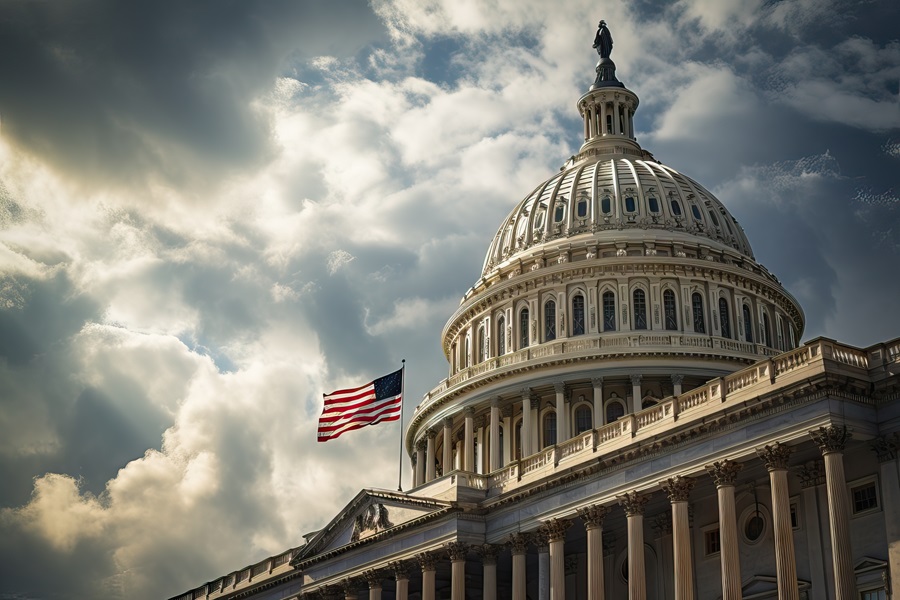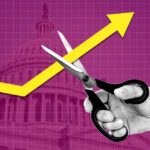After a marathon session deliberating and debating President Trump’s tax and spending cuts measure, One Big Beautiful Bill, Senate Republicans narrowly passed the measure as Vice President JD Vance cast the tie-breaking vote to break the 50-50 deadlock.
President Trump’s $3.3 trillion bill would unlock tax cuts and funding boosts for national security, partially paid for by the biggest cuts to the federal safety net in decades.
One Big Beautiful Bill must pass the House of Representatives before heading to the President’s desk. President Trump has been pushing to get the bill to the White House and signed by July 4th.
“Wow, music to my ears,” Trump said when he was informed that his tax reform measure passed the Senate. “I was also wondering how we’re doing, because I know this is primetime, it shows that I care about you.”
One Big Beautiful Bill seek to save taxpayer dollars by:
- Decreasing the Consumer Financial Protection Bureau’s (CFPB) funding cap: For the first time in 15 years, Republicans have decreased the CFPB’s mandatory funding cap. This provision requires the Bureau to be fiscally responsible but does not affect the statutory functions of the CFPB.
- Inflation Reduction Act (IRA): Rescinding funds from the Inflation Reduction Act’s green housing initiatives and giving the U.S. Department of Housing & Urban Development (HUD) discretion in funding critical housing programs.
- SEC Reserve Fund: Sweeping unused money from an SEC slush fund for technology modernization and eliminates the fund permanently.
Senate Banking Committee Chairman Tim Scott said: “For the first time since the passage of Dodd-Frank, Congress is reining in the unaccountable Consumer Financial Protection Bureau and decreasing its mandatory funding cap by 46%, which will save over $2 billion and require the Bureau to be fiscally responsible. The committee’s language also defunds wasteful Biden administration Green New Deal spending and saves taxpayer dollars by eliminating an unaccountable SEC slush fund. After working closely with my colleagues on the committee and across the Republican conference, as well as with the Senate Parliamentarian, we’ve advanced legislation that helps deliver on President Trump’s mandate to cut waste and duplication in our federal government and save hardworking taxpayer dollars. I urge the House to quickly pass this historic bill and get it to President Trump’s desk.”
Mortgage Bankers Association (MBA) President and CEO Bob Broeksmit, CMB, added: “Building on the bill that passed the House, the inclusion of permanent rounds of Opportunity Zones, along with much-needed improvements to the Low-Income Housing Tax Credit program, will facilitate more housing production. We are also pleased, following MBA’s and a broad set of industry stakeholders’ direct advocacy, that both the Section 899 proposal and restrictions to a pass-through entity’s ability to deduct state and local tax expenses were removed from the Senate legislation. MBA will work with congressional leaders in the coming days to ensure that these beneficial tax policies remain intact in any final package signed into law by President Trump.”
Quite a Journey ... So Far
One Big Beautiful Bill has worked its way through a number of hurdles, obstacles, and debate to date. Last week, Senate Parliamentarian Elizabeth MacDonough ruled that several key pieces of the measure violated the Byrd Rule, a measure that prohibits provisions considered “extraneous” to the federal budget. Among the changes by Senate Parliamentarian MacDonough, striking a provision that would have placed a funding cap on the CFPB, a move that would have cut approximately $6.4 billion from the Bureau, thus reducing the Bureau’s funding to zero percent, and eliminating the agency.
Sen. Scott late last week updated legislative text of provisions in One Big Beautiful Bill, after a marathon weekend of adjusting the legislation to fit parliamentarian rulings. Sen. Scott unveiled that the CFPB’s budget would be slashed in half, as the Bureau’s available operating budget would go from 12% to 6.5% of the Federal Reserve System’s 2009 total operating expenses, adjusted for inflation. The updated provision would decrease the CFPB’s funding cap for a savings of $2 billion, and rescind unobligated funds from the Inflation Reduction Act for green housing initiatives to the Treasury for a savings of $138 million.
“Slashing the CFPB’s budget nearly in half will severely compromise its ability to stand up for consumers and take on big banks and unscrupulous financial firms when they cheat working families out of their hard-earned money,” said Chuck Bell, Advocacy Program Director at Consumer Reports. “Consumers will be more likely to fall victim to shady financial industry practices, hidden fees, and other scams because of this devastating budget cut. Shrinking the CFPB’s funding so dramatically on top of the administration’s ongoing efforts to gut the Bureau will effectively muzzle this critical watchdog and leave consumers more vulnerable to fraud and abuse.”
Yesterday, Sen. Elizabeth Warren, Ranking Member of the Senate Banking, Housing, and Urban Affairs Committee, and all committee Democrats, offered an amendment to protect the CFPB in One Big Beautiful Bill. Sen. Warren spoke on the Senate floor to urge her colleagues to support her amendment.
“The Consumer Financial Protection Bureau is the financial watchdog to keep people from getting cheated on credit cards, mortgages, Venmo, payday loans, and a zillion other transactions. When this financial cop can’t do its job, there is no one else in the federal government to pick up the slack,” said Sen. Warren. “The CFPB has returned over $21 billion to more than 205 million Americans who were cheated by big banks and giant corporations. That is why this agency is popular across the country. But, from the beginning, Republicans in Congress have been trying to kill it, and now they want to slash the CFPB’s modest funding cap in half. Not to save working people money. But to make it easier for corporations to trick and trap millions of people. Scammers love this Republican move. I urge my colleagues to vote yes to support the CFPB, the little agency that fights for all Americans. And I reserve the remainder of my time.”
The Impact on Housing
In addition to all of the bill’s CFPB-related provisions, several other provisions within the measure support homeownership and aim to strengthen the nation’s real estate economy, including:
- A permanent extension of lower individual tax rates
- An enhanced and permanent qualified business income deduction (Section 199A)
- A temporary (five-year) quadrupling of the state and local tax (SALT) deduction cap, beginning for 2025
- Protection for business SALT deductions and 1031 like-kind exchanges
- A permanent extension of the mortgage interest deduction
“These provisions form the backbone of the real estate economy—from supporting first-time and first-generation buyers to strengthening investment in housing supply and protecting existing homeowners,” said National Association of Realtors (NAR) EVP and Chief Advocacy Officer Shannon McGahn. “Real estate makes up nearly one-fifth of the entire U.S. economy, and we made sure policymakers understood that homeownership is the essential component to building wealth and a strong, prosperous middle class.”
According to McGahn, NAR was at the negotiating table through the final hours of the bill’s passage.
“We’ve worked for months to educate Congress through original NAR research, analysis and polling to demonstrate the value and broad support for the many real estate provisions in this bill,” said McGahn. “Congressional leaders were receptive to our message. Our team had many conversations with lawmakers, and they thanked us for our public support and for providing the data they needed to support these provisions.”
McGahn noted several other provisions in the bill championed by NAR including:
- Low-Income Housing Tax Credit (LIHTC): Key provisions from the LIHTC Improvement Act are included on a permanent basis to support affordable housing development.
- Child Tax Credit Increased to $2,200: Permanently raises the credit, with inflation indexing. This provision could ease housing affordability for families.
- Permanent Estate and Gift Tax Threshold Set at $15 Million (Inflation-Adjusted): Prevents a sharp drop in exemption levels and supports generational wealth transfer.
- No Increase to the Top Individual Tax Rate: The proposed 39.6% rate was removed from the bill.
- Restoration of Key Business Provisions: Full expensing of research and development; bonus depreciation; and fixes to the interest expense deduction limit
- Immediate Expensing for Certain Industrial Structures: Applies to facilities used in manufacturing, refining, agriculture, and related industries.
- Strengthened Opportunity Zones: Renewed with revised incentives to promote targeted investment, including in rural areas. NAR polling found that 80% of voters support such tax incentives to drive economic development in underserved communities.
NAR conducted a national survey in May, and found overwhelming public backing for the real estate provisions in the legislation. Among the findings:
- 92% support tax-free savings accounts for first-time home buyers
- 91% support preserving tax incentives like the mortgage interest deduction
- 86% support maintaining lower-income tax rates for individuals and married couples
- 83% support the 20% deduction for independent contractors and small businesses
- 61% support increasing SALT deduction limits or removing limits altogether
“NAHB commends the Senate for passing the One Big Beautiful Bill Act,” said Buddy Hughes, Chairman of the National Association of Home Builders (NAHB). “This legislation will help spur economic growth and allow our members to invest more resources in multifamily rental construction, land development to build more single-family homes, and new equipment to expand their businesses. In turn, this will create a better business climate that allows builders to increase the nation’s housing supply, which is crucial to help ease America’s housing affordability crisis. We urge the House to move quickly to pass this bill.”





